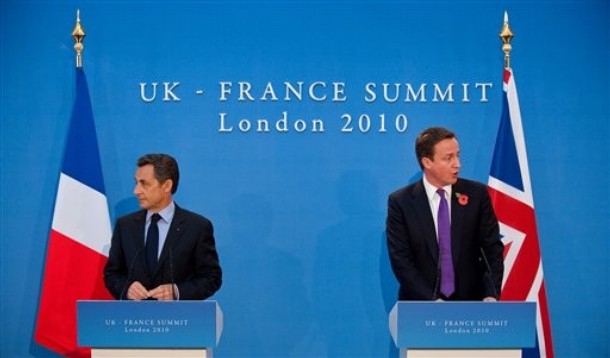
From the Office of the Prime Minister: Today, we have decided to intensify our co-operation still further. We want to enable our forces to operate together, to maximise our capabilities and to obtain greater value for money from our investment in defence. We plan to increase the range and ambition of our joint defence equipment programmes, and to foster closer industrial co-operation. …
We have decided:
a) to sign a Defence & Security Co-operation Treaty to develop co-operation between our Armed Forces, the sharing and pooling of materials and equipment including through mutual interdependence, the building of joint facilities, mutual access to each other’s defence markets, and industrial and technological co-operation;
b) to collaborate in the technology associated with nuclear stockpile stewardship in support of our respective independent nuclear deterrent capabilities, in full compliance with our international obligations, through unprecedented co-operation at a new joint facility at Valduc in France that will model performance of our nuclear warheads and materials to ensure long-term viability, security and safety – this will be supported by a joint Technology Development Centre at Aldermaston in the UK;
c) to sign a Letter of Intent, creating a new framework for exchanges between our Armed Forces on operational matters;
d) to direct the UK-France High Level Working Group to strengthen its work on industrial and armament cooperation; and
e) to pursue joint initiatives in the areas detailed below …
22. NATO remains the fundamental guarantor of Europe’s security. We share the same objectives for the forthcoming NATO Summit in Lisbon. In particular, we are looking for major decisions on reform to ensure NATO’s efficiency and effectiveness. We also want a new Strategic Concept that: makes clear NATO’s continuing commitment to collective territorial defence and to addressing threats to Allies’ security wherever they stem from; addresses new threats to Allies’ fundamental security interests; and underlines NATO’s desire to work with a wide range of partners. In this context, we will pursue closer co-operation across the board between NATO and the EU, and a lasting partnership between NATO and Russia based on practical co-operation and reciprocity.
23. As long as nuclear weapons exist, NATO will remain a nuclear alliance. British and French independent strategic nuclear forces, which have a deterrent value of their own, contribute to overall deterrence and therefore to Allies’ security. These national minimum nuclear deterrents are necessary to deter threats to our vital interests. We will support a decision in Lisbon on territorial missile defence, based on the expansion of the ALTBMD system, which is financially realistic, coherent with the level of the threat arising from the Middle East, and allows for a partnership with Russia. Missile defence is a complement to deterrence, not a substitute.
Excerpts from the UK–France Summit 2010 Declaration on Defence and Security Co-operation signed by British Prime Minister David Cameron and French President Nicolas Sarkozy. (photo: AP)
Image: AP%2011%202%2010%20Nicolas%20Sarkozy%20David%20Cameron.jpg
